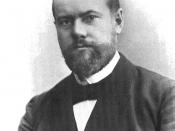In his work, "The Distribution of Power Within the Political Community: Class, Status, Party", Max Weber gives a very detailed description of how society works within its classes, status groups and parties. All communities are arranged in a way where goods from different type, tangible and intangible, symbolic and material are distributed. Thus, such distribution is always unequal and necessarily involves power. As Weber explains, " 'classes', 'status groups', and 'parties' are phenomena of the distribution of power within a community" (Webber, 207). In many ways this explains why class conflict does not dominate politics in advanced industrial societies. More specifically, class conflict is not a dominant factor in the politics of more industrialized societies, since the distribution of power depicts a stable backbone to support and provide for the classes, thus instead of conflicting with one another they create a social mobility between the classes.
In order to grasp the idea of power being a support center for classes, status groups and parties, more detailed observations are needed on what they represent and stand for in Weber's perspective idea.
In Webber's ideas we see how status groups define social order, classes make the economic order and the parties the legal/political order. Each order is interrelated and affects the other. However, no distribution between the classes, status groups and parties would be possible without the existence of a strong authoritarian power to execute what is best for the society. Power, as Webber defines it, is "the chance of a man or a number of men to realize their own will in a social action even against the resistance of others who are participating in the action" (Weber, 206). He provides examples of different types of power, resting in a variety of bases. Economically conditioned power is differentiated from...


